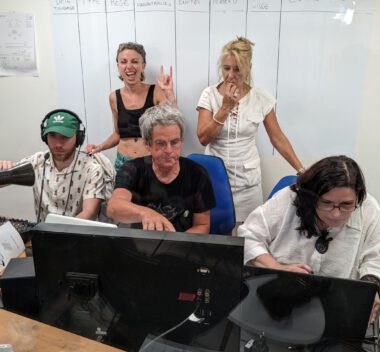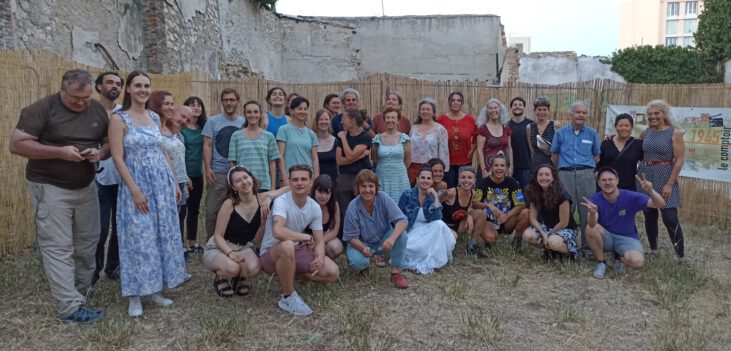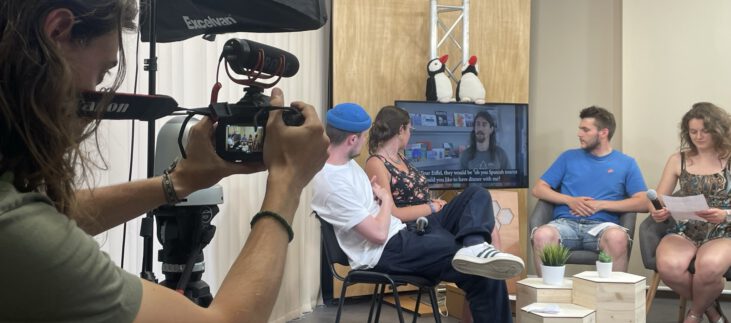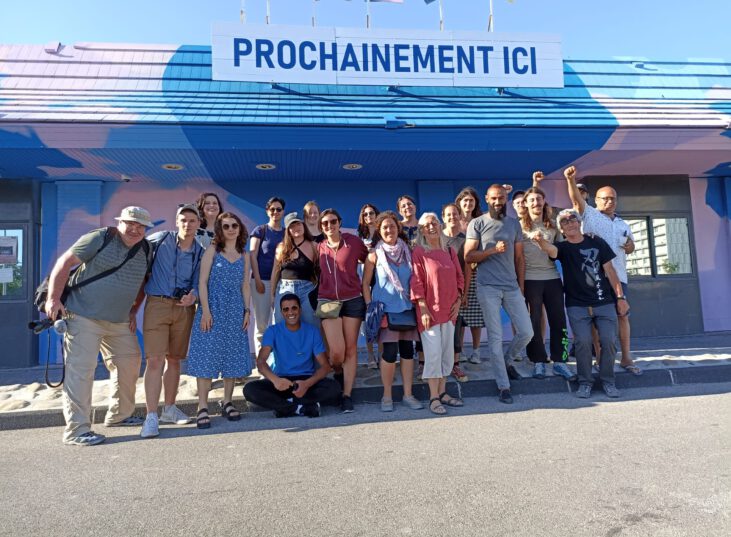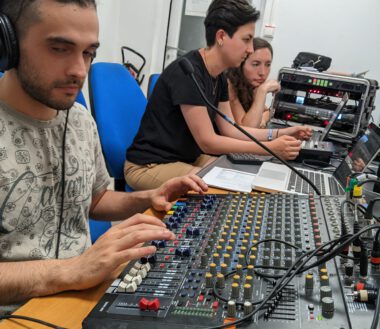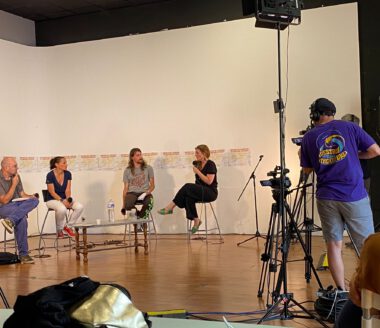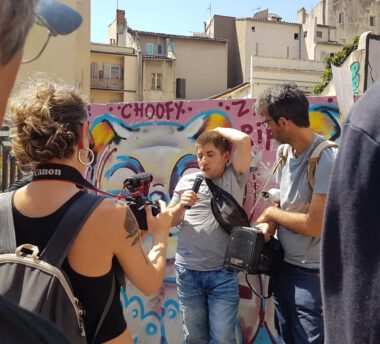Meetings | Experience Fellowship
78 employees from Romania, Germany, France, Poland and Spain
A total of 78 employees from the partner organizations take part in a total of six project meetings and four 5-day learning activities. Together, they develop and test further training courses for media educators that aim to strengthen and expand their skills. The main goal is the exchange and development of tools and methods aimed at a stronger and sustainable opening of the institutions involved to social groups affected by exclusion (intercultural opening). As an indirect target group of the project, they should use media for their own interests and become subjects of reporting.
The aim is to develop and strengthen competencies in the area of inclusive media education: exchange about methods of media competence transfer in media work with marginalized, vulnerable groups.
Our findings are getting documented!
Train the Trainer Meeting in Magdeburg (June 2021)
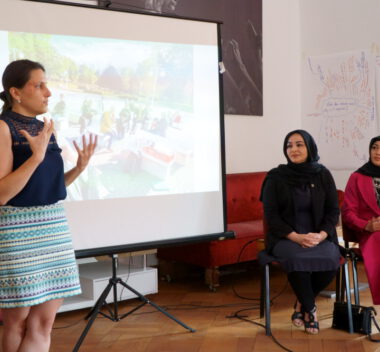
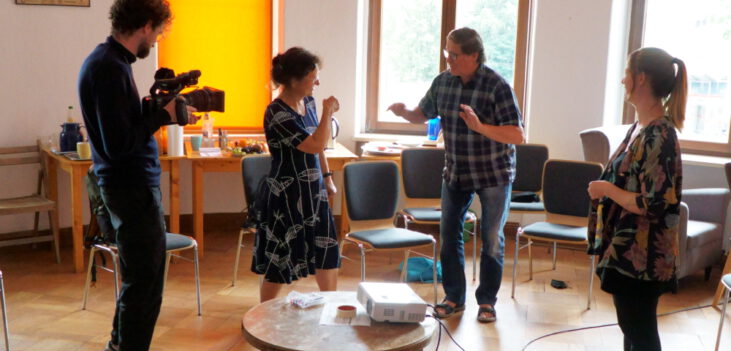
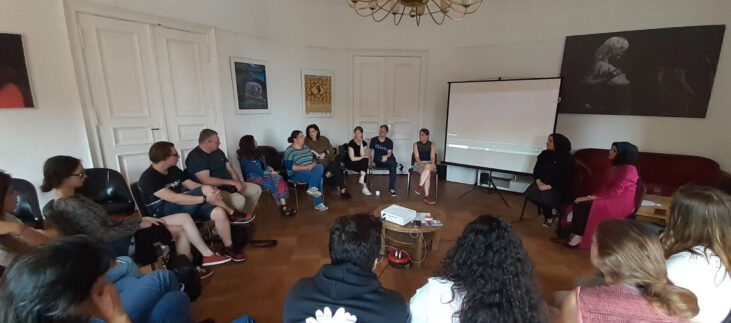
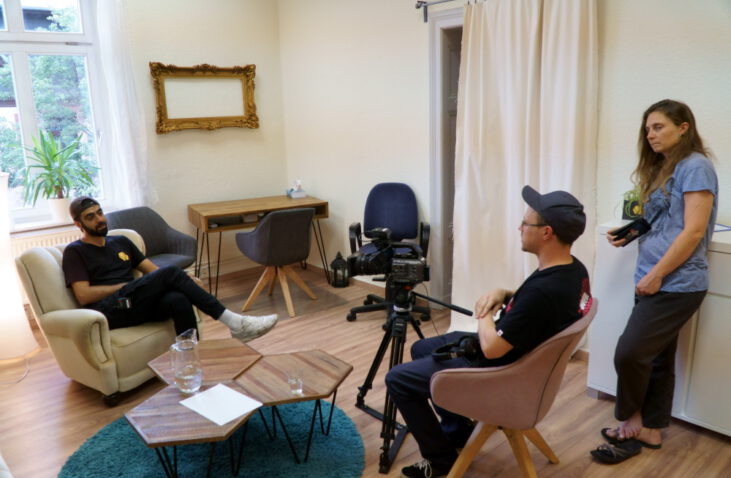
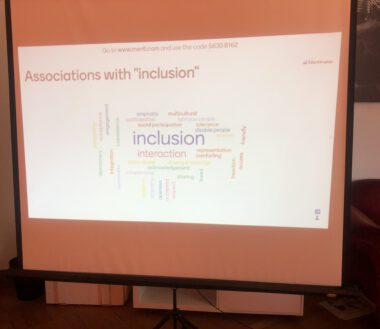
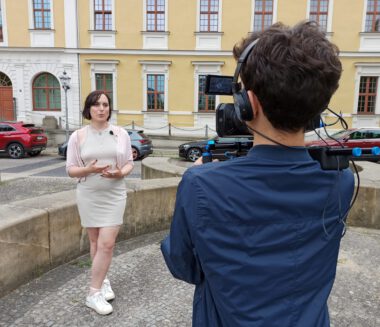
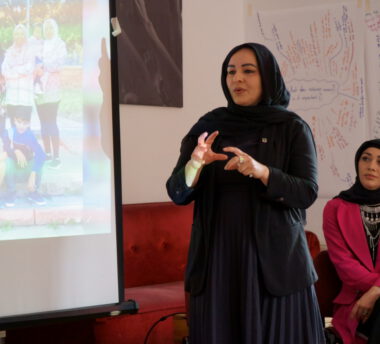
The first non-virtual meeting of all partners took place in Magdeburg in June 2021. It kicked off with the first train-the-train activity with around 20 staff from the partner countries.
A whole week was devoted to inclusion: What does "inclusion" mean? How inclusive are participatory media? Which target groups do they reach and how? How can they live up to their claim to involve vulnerable groups? In which country-specific contexts do they work? Which groups are excluded from participation in the individual European countries? And in what ways are they reported ABOUT in the major media without having a voice themselves? These were the big guiding questions, the answers to which began in Magdeburg.
Invited to talks with the European partners were a number of experts in their own right: representatives of so-called vulnerable groups who reported on their specific experiences as a recognisable minority and articulated their needs, especially in relation to media representation. Representatives of the association "AFIMA", in which Afghan women refugees are organised, were invited. The women have been living in Germany since the "refugee summer" of 2015 and have to deal with numerous prejudices and everyday discrimination. The women presented the video project "FrauenStärken" (Women's Strengths), which was realised in the spring and summer at Offener Kanal Magdeburg.
In addition to this expert talk, small audiovisual contributions were created with three groups:
Silent Roses is an association of deaf people; together with the participants of the encounter, the participants developed a treatment and shot a small documentary about the group and their experiences as a social group strongly affected by exclusion. (link to the contribution)
Tiam e.V. (Trans-Inter-Aktiv in Mitteldeutschland) is an association that represents the interests of transsexual people. Together with representatives of the association, a small portrait of the association, its field of activity, its needs and interests was created. (Link to the film)
Villa Wertvoll is a cultural youth centre in a district that is considered a "social hotspot". Numerous children from the neighbourhood spend their free time there and are accompanied by Zico, a young man who came to Germany as a refugee in 2015. Together with Zico and the children, a contribution was made documenting Zico's work with the children.
After research and preparation, the films were shot and edited over two days. Following the screening of the films in the whole group, there was an intensive evaluation and reflection on the experiences that the participants had made during the joint work. The experiences led to a catalogue of rules to be observed in active media work with vulnerable groups.
Train the Trainer Meeting in Warsaw (November 2021)
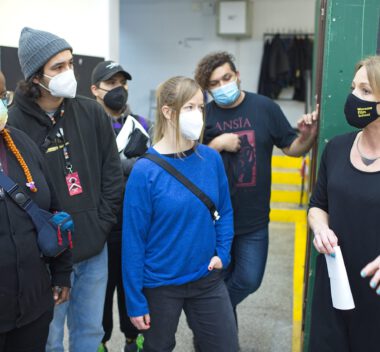
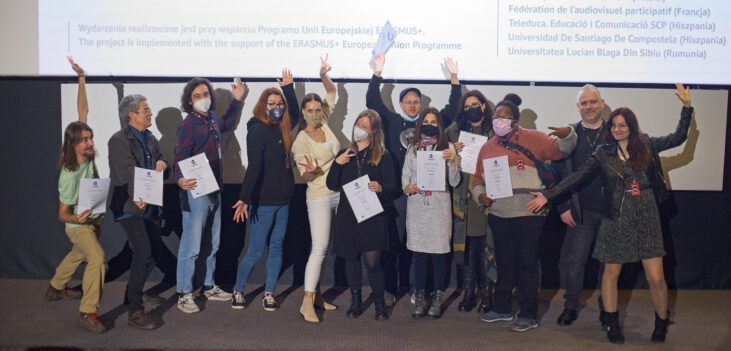
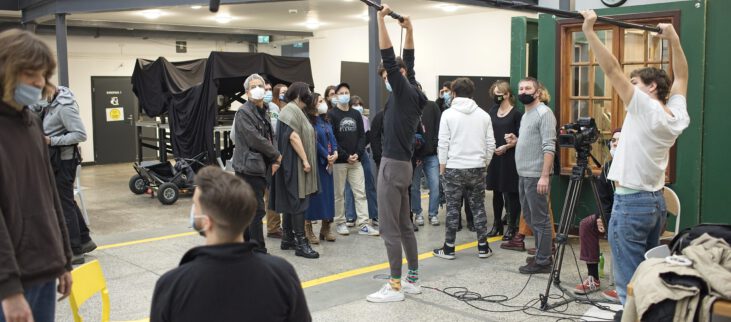
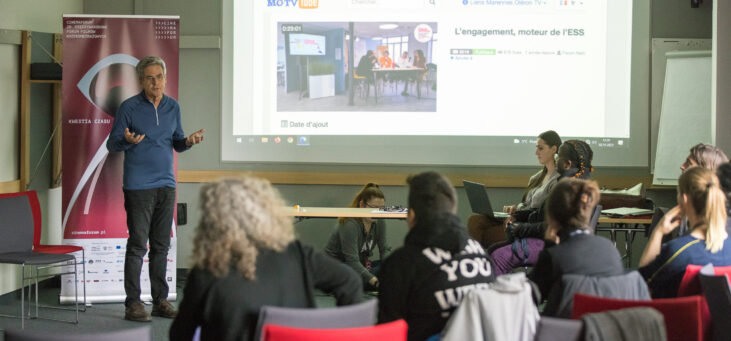
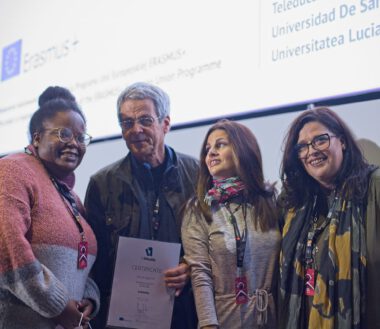
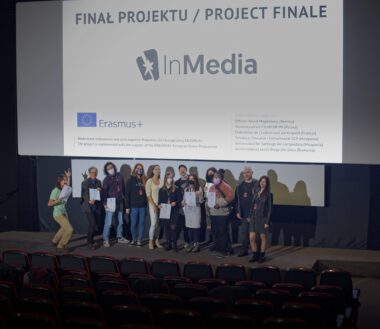
The second InMedia project meeting took part from November 2nd to November 7th 2021 in
the capital city of Warsaw.
The meeting was focused on familiarizing participants from partner organizations with the specificity of working with people from excluded groups in Poland. Participants had the opportunity to meet with activists from important Polish organizations working with young people from less privileged backgrounds or LGBT+ communities. An important aspect of the visit to Poland was getting to know the main projects of the
FILMFORUM Association and the methods of their work that allow young people from marginalized backgrounds to take their first steps in the world of film, which would otherwise be very expensive and much more difficult.
During their stay in Poland InMedia group took part in several workshops and meetings with many specialists working with excluded groups in Poland.
They have also met the director of CINEMAFORUM Festival – Błażej Hrapkowicz who presented methods of programming the international film festival.
First participants got to know the methods and work approaches of the Polish partner and exchanged views on similarities and differences in the common professional field.
Karim Kourani – youth trainer and vice-president of KINOGRAPHE Association conducted
the workshop „Methodology of working with young people from socially excluded backgrounds”
and explained the methods he is using to educate young filmmakers during his workshops.
The group got familiar with innovative education methods presented by Ewa Maria
Szczepanowska – Head of PR at Warsaw Film School – one of the biggest and most important film schools in Poland. After the presentation participants had a chance to take part in lectures with the school’s students. The young educators used their free time to get to know popular places related to the complicated history of Warsaw.
InMedia project participants had also a chance to create their own promotional event strategies during the workshops conducted by Agata Strzelichowska – Head of PR at FILMFORUM Association. She has also presented the FILMFORUM projects, explaining that the main goals of the organisation are focused around issues like social inclusion, intercultural tolerance, entrepreneurial activation (in particular in the scope of involving young people in innovative activities in creative sectors).
During the meeting with Wiktor Morka – director of the LGBT Film Festival participants had a unique opportunity to hear how to organize a big event for the exluded groups of the LGBT+ community.
Urszula Hajdukiewicz and Yevgeniy Glazkov – artists from dancing groups associating people from the LGBT+ community, presented a methodology of working with young people from socially excluded backgrounds. This was the moment when the participants were sensitized to country-specific characteristics of the media landscape on the subject of the LGBT+ community and understand the country's social challenges.
On the last day of the InMedia meeting in Poland, participants took part in project finale where they received certificates and had a chance to sum-up the whole week of workshops and meetings. They had also a unique opportunity to watch best short movies from all around the world during the screenings at the CINEMAFORUM Film Festival.
The third InMedia project meeting took part from May 30th to June 4th 2022 in
the city of Marseille.
During this meeting organised by the Fédération de l'Audiovisuel Participatif (FAP), one of the objectives was to meet different media members of the FAP on their territory and to understand their approach, with:
- the production of a television programme about diversity with Anonymal in Aix-en-Provence, with young people from a social centre in Belgium taking part in another Erasmus project.
- a visit to Télé Mouche premises and the Longchamp district.
- a guided tour by and with young people of Belsunce district, developed with the augmented reality software of Tabasco Video and consisting of participative videos on the history of the neighbourhood and the life of its
inhabitants.
- the production of a television set about local and alternative media, with guests present for the occasion, at the Comptoir de la Victorine, a cultural and creative place in the Belle de mai district, with Les Têtes de l'Art, which promotes access to culture for the district's inhabitants.
It was also an opportunity to meet the FAP's member organisations from all over France for their annual festival, which is a time for sharing, training and screening.
It was also an opportunity to meet the FAP's member organisations from all over France for their annual festival, which is a time for sharing, training and screening. During this event, the companions presented their organisations and exchanged with around sixty people representing some thirty structures, about the local
specificities of their work, their vision of inclusiveness and their methods for implementing it. It was also an opportunity to see some of their productions on the big screen during public screenings, to follow a workshop on sharing participatory practices with a Brazilian guest specialist in Augusto
Boal (creator of the methodology of the theatre of the oppressed), and to meet with local and alternative radio stations, newspapers and news websites during a live radio show on how they give voice to the so-called vulnerable groups and talk about their issues.
Throughout the week, the companions were able to discover different underprivileged areas of Marseille and meet local organisations working on inclusion and promoting living together in their area, each with their own methods:
- Après-M, a solidarity restaurant organised by and for the ones who are economically
disadvantaged in Sainte Marthe neighbourhood. It recovers unsold goods,
distributes food parcels, cooks affordable meals and preserves. Jobs are thus
created in the neighbourhood, as well as a training opportunity for young
people.
- Ferme Capri, an urban farm that develops local agricultural production in La
Delorme neighbourhood, made in a participatory and educational way with the
inhabitants, to be sold at affordable prices in the neighbourhood.
- Manifesten, in La Plaine neighbourhood, an associative bookshop, canteen and cultural venue
that organises concerts, conferences, screenings, concerts and workshops with
other associations.
- Le bouillon de Noailles, a solidarity cooking association in Noailles district
which allows those who cannot afford it to eat their fill, consume good quality
products and be able to cook for themselves.
- Coco Velten, in Belsunce district, a cultural place, offering workshops for
young people and adults, food distribution and professional reintegration, with
a canteen, a space for social accommodation and a work space housing the
premises of numerous associations.
Last but not least, reports have been produced and edited by the companions using participatory methodologies on some of these organisations. They are available here.
Train the Trainer Meeting in Barcelona (February 2023)
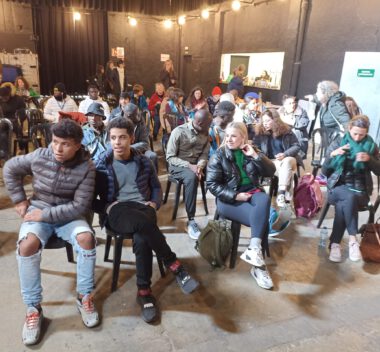
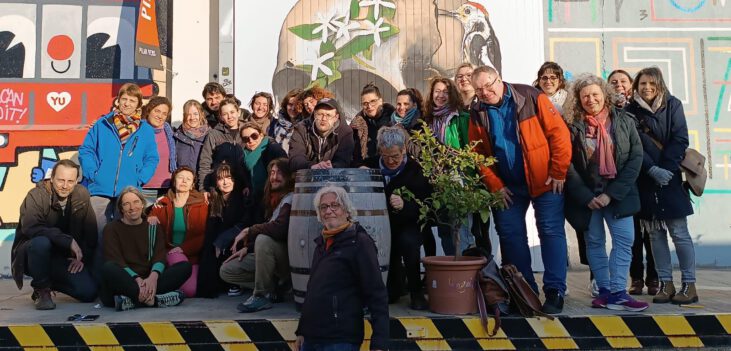
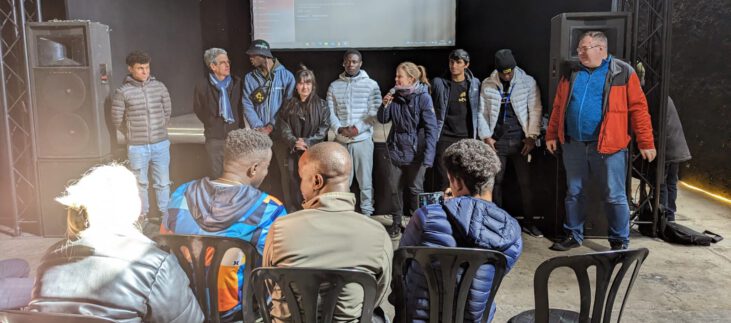
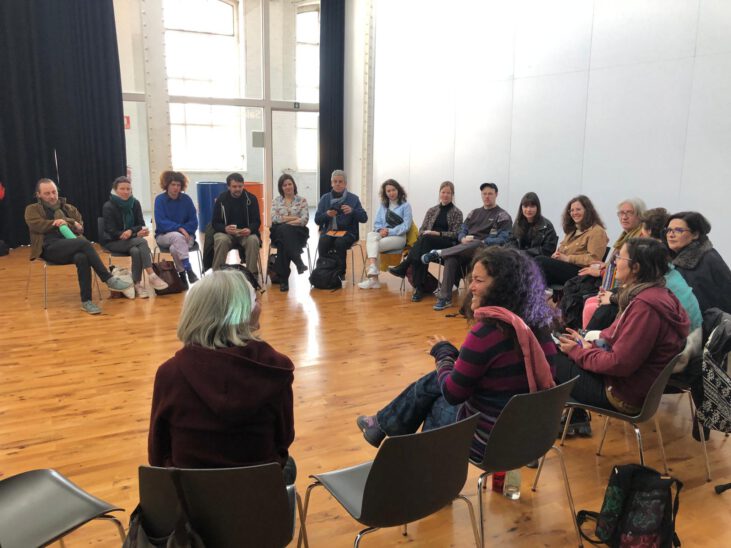
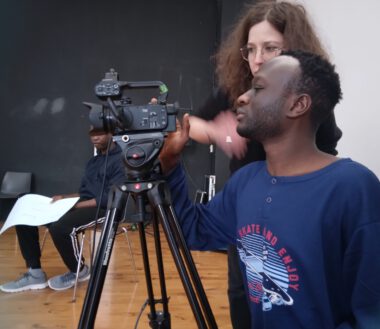
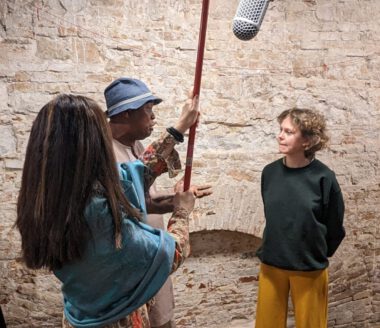
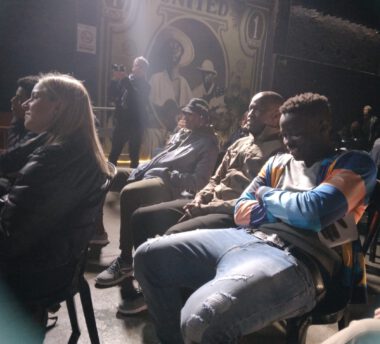
The fourth InMedia project meeting took part from February 6th to 11th 2023 in
the catalonian city of Barcelona.
During oneweek in February, a group of professionals from the various InMedia member
entities met to continue exploring how participatory audiovisual methods can
help promote social inclusion.
Training was divided between a more theoretical part, explaining Teleduca’s framework for
working with participatory audiovisuals, with edu-communication being the main
focus of all our activities. We worked together applying several group dynamics
to identify the elements necessary for edu-communicative processes to
successfully promote social inclusion.
We explained the various participative audiovisual methodologies that Teleduca applies
with different community groups, focusing especially on Set Comunica’t. The
practical part of the training course is based on this methodology.
Once the theoretical framework was established and discussed, we divided up into groups
to work on Set Comunica’t with actual community groups in the city to gain
hands-on experience with the possibilities that this methodology offers for
social inclusion. For two days, four groups carried out workshops with youth
from the local entities Prollema, Bassam Youth Centre and SCI Catalonia.
At the end of the workshop, each group made a public presentation of their experience and
audiovisual results at Nau Bostik, along with the youth with whom they had
worked. This touching final event and workshop allowed us all to demonstrate the
full potential that participatory audiovisuals have in promoting social
inclusion.
